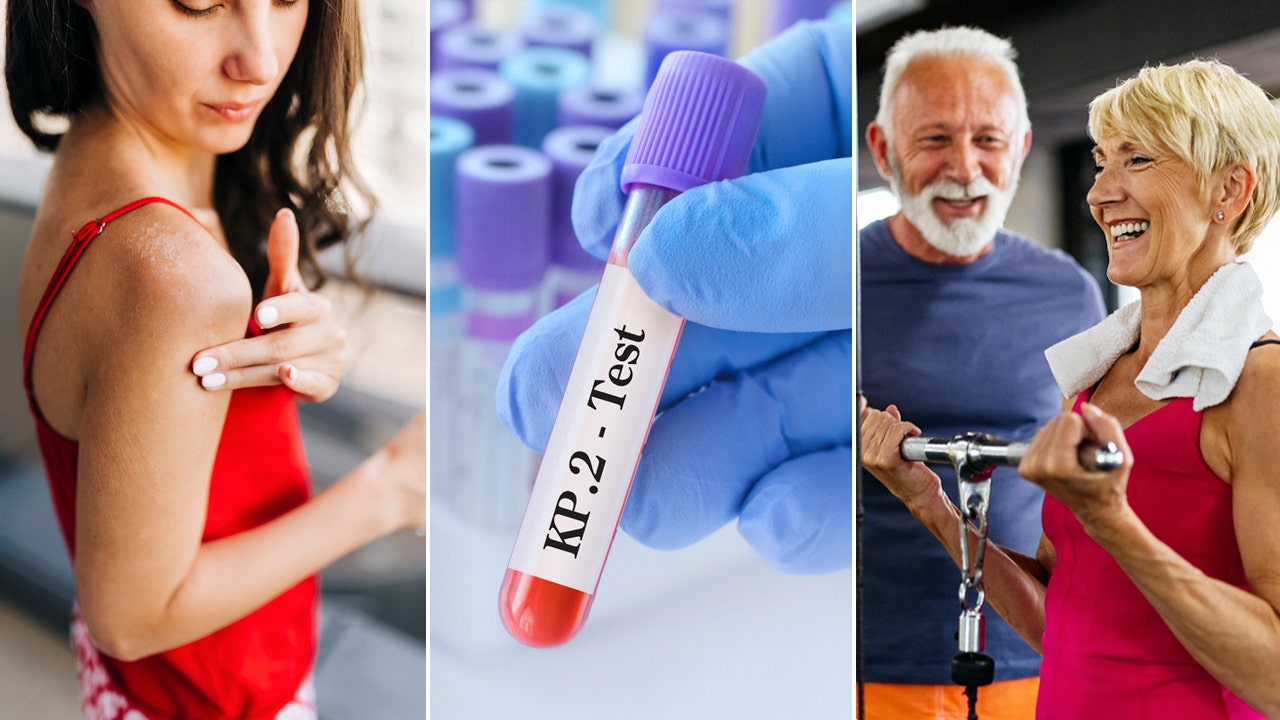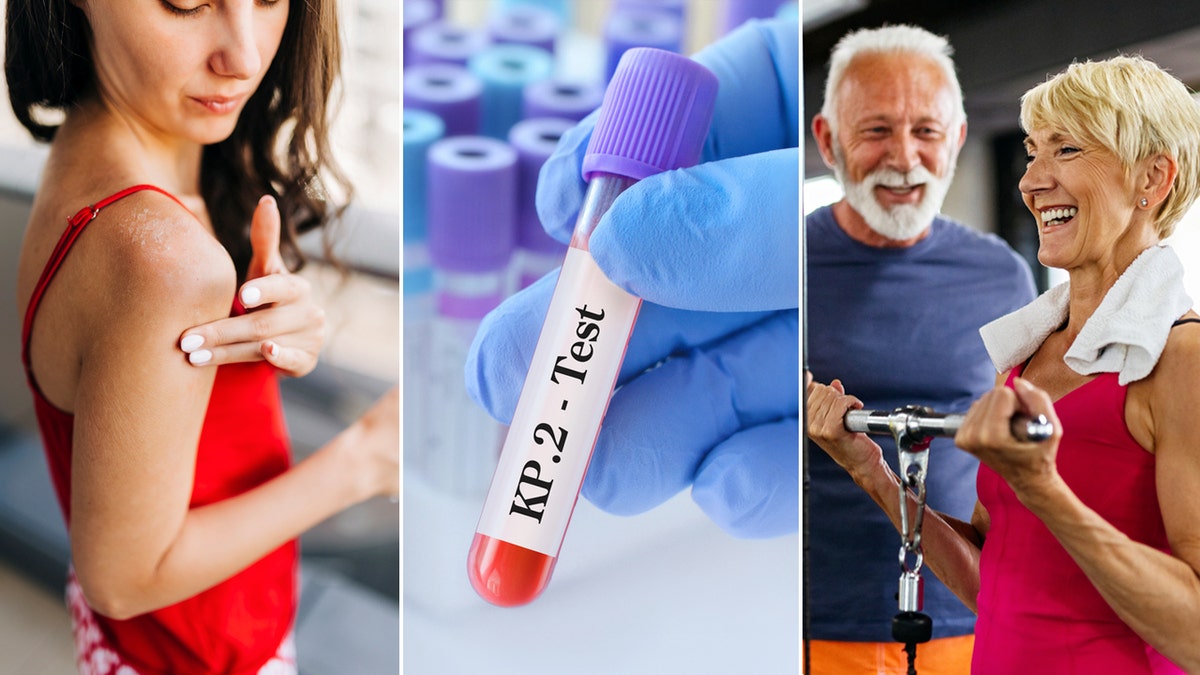Health
Breakthrough for multiple sclerosis sufferers may involve helpful hormone: ‘Patients should remain optimistic’

A hormone released during pregnancy could help reverse damage in the cortex of the brain caused by multiple sclerosis (MS), a recent study led by UCLA has found.
In people with MS, a potentially disabling autoimmune disease, immune cells attack and damage a protective coating called myelin, which surrounds nerves in the brain and spinal cord.
When myelin is damaged, the nerve cells can no longer communicate with each other, which triggers symptoms of the disease.
TEENAGER IS PRIMARY CAREGIVER FOR NEW MEXICO MOM WITH MS: ‘WE’RE A TEAM’
“Atrophy in the cortex, the largest and most complex part of the brain, is associated with permanent disability worsening, including cognition impairment and paralysis,” lead author Allan MacKenzie-Graham, an associate professor of neurology at UCLA, told Fox News Digital in an emailed statement.
In the study — published last month in Laboratory Investigation, a peer-reviewed medical journal of pathology — researchers gave a pregnancy hormone called estriol to mice that had a preclinical model of MS.
A hormone released during pregnancy could help reverse damage in the cortex of the brain caused by multiple sclerosis (MS), a recent study led by UCLA found. Th study was published in a peer-reviewed medical journal. (iStock)
The hormone was shown to slow damage, while also generating new myelin in the brains of the mice.
Currently, there are no FDA-approved treatments to repair MS-induced damage in the brain’s cortex — only treatments to decrease inflammation and slow the disease.
Many groups have been trying for over a decade to achieve brain repair, but the results have been discouraging, said MacKenzie-Graham.
BROOKE BURKE BATTLING THREE AUTOIMMUNE DISEASES, SAYS SHE’S ‘FRAGILE’ DESPITE FIT PHYSIQUE
“We were surprised (and very happy) that we were able to do it,” he also said.
One possible reason for the successful outcome is that estriol is a natural estrogen produced during pregnancy, the researcher said.
In a way, the hormone could have simulated the process of myelin creation during brain development in the womb.

Estriol is a natural estrogen that is produced during pregnancy. The hormone could have simulated the process of myelin creation during brain development in the womb. (iStock)
“Estriol targets the cells that produce myelin, encouraging them to produce more,” he said. “It also inhibits the cells that block new myelin production.”
He added, “Since we are using a natural hormone, there are complementary effects on multiple cell types, as opposed to synthetic drugs that target only one cell type.”
‘Very excited’
Dr. Mary Ann Picone, medical director of the MS Center at Holy Name Medical Center in Teaneck, New Jersey, was not involved in the study but said she was “very excited” to see the results.
“We have seen in earlier phase 2 studies the positive effect of estriol on decreasing inflammatory activity within the brain, but this study shows even greater ability of estriol to help in preserving brain volume, which could translate into slowing of disability progression and possibly reversing disability,” she told Fox News Digital in an emailed statement.
“A personalized medicine approach … holds promise for finding new treatments.”
Estriol has long been known to have an immunoprotective benefit during pregnancy, particularly in the third trimester, Picone noted.
So she wasn’t surprised to learn that it could help protect brain health.
Personalizing treatments for genders
The study highlights a successful example of a treatment designed specifically for women, MacKenzie-Graham said, taking into account the biological differences between men and women.
“This accomplishment aligns with the National Institutes of Health (NIH) prioritizing the study of sex as a biological variable in all research grants,” he said.

“Atrophy in the cortex, the largest and most complex part of the brain, is associated with permanent disability worsening, including cognition impairment and paralysis,” said lead author Allan MacKenzie-Graham. (iStock)
In prior studies, estriol has been used to treat menopausal women who are experiencing cognitive impairment, while testosterone has been used to treat men with MS, “an approach that reduced brain atrophy in a pilot clinical trial,” MacKenzie-Graham said.
“A personalized medicine approach, which uses tailored treatments optimized for biologic processes in each sex, holds promise for finding new treatments for neurodegenerative diseases,” he said.
Limitations of the study
The main limitation of the study is that it was conducted in a preclinical model of MS using mice, said MacKenzie-Graham.
“The next step is to test these findings in human clinical trials to determine if estriol treatment can induce remyelination in the brains of people with MS,” he told Fox News Digital.
There is also a need to determine the safety of long-term estriol use in humans, Picone added.
“Patients should remain optimistic about the potential for treatments that can repair myelin damage and improve disabilities.”
Overall, the researchers believe this research brings hope for better treatments for multiple sclerosis.
CLICK HERE TO SIGN UP FOR OUR HEALTH NEWSLETTER
“The discovery of estriol’s ability to induce repair in the cortex is an exciting breakthrough,” said MacKenzie-Graham. “Patients should remain optimistic about the potential for treatments that can repair myelin damage and improve disabilities.”
He also said, “This may be accomplished by considering biological variables, such as sex, in developing tailored treatments.”

Nearly one million people are currently living with MS in the U.S., according to the National Multiple Sclerosis Society. (iStock)
Additionally, he calls for researchers to further investigate the beneficial effects of estrogens in protecting and repairing the brain in neurodegenerative diseases such as MS and Alzheimer’s disease.
“Instead of the standard estrogens that have used for over 30 years in birth control pills and hormone replacement therapy, neuroscientists should investigate unique estrogens that can induce brain repair, particularly those that recapitulate the effect of pregnancy on brain development,” he added.
Nearly one million people are currently living with MS in the U.S., according to the National Multiple Sclerosis Society, a nonprofit headquartered in New York.

Health
Paleo and Atkins Diets: Low-Carb for Different Reasons | Woman's World

Sign Up
Create a free account to access exclusive content, play games, solve puzzles, test your pop-culture knowledge and receive special offers.
Already have an account? Login
Forgot your password?
Get back to the Sign In
Use left and right arrow keys to navigate between menu items.
Use escape to exit the menu.
Health
7 important health stories this week you simply can't miss

Every day of the week, Fox News Digital publishes a range of health and wellness pieces to keep you up-to-date on medical research, new medications, mental health trends, success stories and more.
In case you missed them, here are a few of the biggest health stories from the past week.
As always, you can see a full list of recent health pieces at http://www.foxnews/health.
CLICK HERE TO SIGN UP FOR OUR HEALTH NEWSLETTER
1. FDA tells COVID vaccine makers to update their fall shots
The U.S. Food and Drug Administration recommended that COVID vaccine manufacturers update their formulas for fall doses, in an attempt to target the KP.2 strain of the JN.1 variant.
Dr. Marc Siegel shared insights on the risks as this variant grows more prominent. Click here to get the story.
“It makes sense to target the KP.2 strain because it is becoming the predominant strain — it is surging in California and will spread across the country,” Siegel told Fox News Digital. (iStock)
2. Expert offers 7 tips to soothe sunburned skin
If not treated properly, sunburn can lead to severe skin damage and increase the risk of skin cancer, experts warn.
Angela Rosoff, a San Francisco-based wellness and beauty expert, shared some proven remedies to treat sun-damaged skin. Click here to get the story.

More than one out of every three adults experienced a sunburn last year, according to a survey by the American Academy of Dermatology. (iStock)
3. Tiger mosquitoes blamed for spread of dengue fever
As dengue fever continues to spread throughout Europe, experts are naming an invasive mosquito species as the culprit.
CANCER NEARLY TOOK HIS LEG, BUT NEW JERSEY FATHER OF 6 WALKS AGAIN: ‘I SHOULDN’T BE HERE’
Infectious diseases experts weighed in on the level of risk and share prevention tips. Click here to get the story.

Tiger mosquitoes — the species Aedes albopictus — have spread into 13 EU countries, according to an alert from the European Centre for Disease Prevention and Control. (iStock)
4. Certain exercises could reverse Alzheimer’s, expert says
In her new book, “Reversing Alzheimer’s,” Dr. Heather Sandison, a renowned expert in dementia care, offered specific recommendations for the types of exercise that can benefit patients living with the disease.
“Exercise benefits several of the root causes of neurological disease,” she wrote. Click here to get the story.

Sunburn remedies, new COVID vaccines, anti-Alzheimer’s exercises and more important stories are covered here. (iStock)
5. Experts bust sunscreen myths
Some claims on social media about sun safety have led to a major misconception that sunscreen could cause skin cancer.
Dermatologists debunk these potentially dangerous myths. Click here to get the story.

Thirty-two percent of Americans believe that a tan makes people look better and healthier, according to the Orlando Health Cancer Institute study. (iStock)
6. New Alzheimer’s drug gets thumbs-up from FDA advisory committee
Donanemab, designed to treat mild cognitive impairment and other symptoms of early Alzheimer’s disease, was endorsed by a U.S. Food and Drug Administration advisory panel.
Here’s what that could mean for patients. Click here to get the story.

Eli Lilly officials presented clinical trial results showing that the drug, donanemab, slowed cognitive and functional decline for people with mild cognitive impairment due to early stages of Alzheimer’s. (iStock)
7. FDA panel rejects MDMA-assisted therapies for PTSD
Many veterans’ hopes were dashed when an FDA advisory committee voted against the overall benefits of MDMA when used to treat PTSD.
Advocates and doctors discussed what this means for the future of psychedelic treatments. Click here to get the story.

“When I heard the verdict, all I could think about was the hopes of those veterans being dashed … and not having a solution for them,” one advocate said. (iStock)
Health
Better Than Ozempic? Doctors Say These Medications Are Better for Weight Loss Than the Popular Semaglutide

Sign Up
Create a free account to access exclusive content, play games, solve puzzles, test your pop-culture knowledge and receive special offers.
Already have an account? Login
Forgot your password?
Get back to the Sign In
Use left and right arrow keys to navigate between menu items.
Use escape to exit the menu.
-

 News1 week ago
News1 week agoIsrael used a U.S.-made bomb in a deadly U.N. school strike in Gaza
-

 World1 week ago
World1 week agoFrance to provide Ukraine with its Mirage combat aircraft
-

 World1 week ago
World1 week agoRussia-Ukraine war: List of key events, day 833
-

 News1 week ago
News1 week agoNonprofit CFO Accused of 'Simply Astonishing' Fraud
-

 Politics1 week ago
Politics1 week agoGeorge Clooney called White House to complain about Biden’s criticism of ICC and defend wife’s work: report
-

 Politics1 week ago
Politics1 week agoNewson, Dem leaders try to negotiate Prop 47 reform off California ballots, as GOP wants to let voters decide
-

 World1 week ago
World1 week ago‘Bloody policies’: Bodies of 11 refugees and migrants recovered off Libya
-

 Politics1 week ago
Politics1 week agoEmbattled Biden border order loaded with loopholes 'to drive a truck through': critics















